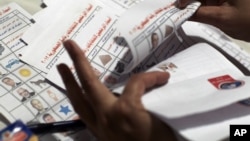CAIRO - As election officials count the vote from Egypt's historic presidential election, the Muslim Brotherhood is claiming its candidate is in the lead. But Mohamed Morsi appears to be just one of several candidates who are doing well in a race that is headed to a run-off.
Preliminary results indicate Muslim Brotherhood contender, Mohamed Morsi, is ahead with about 30 percent of the votes tallied so far.
But it's not clear who might be in second place and potentially face Morsi in a run-off next month. Former Air Force chief Ahmed Shafiq and socialist Hamdeen Sabahi, a favorite of youth activists who showed a surge in the last days of the campaign, appear neck and neck.
Independent Islamist Abdel Moneim Aboul Fotouh was also still in the running, although former foreign minister and ex-Arab League chief Amr Moussa appears to be lagging.
Tallies from major cities, including Cairo and Alexandria, have yet to be released. Final, official results are expected next week.
The success of the Brotherhood is not likely to be questioned, as its organization, dating back 80 years, has extensive grass roots support.
But if, as the Brotherhood contends, the next ranking contender is Shafiq, the news could be contentious. Shafiq, the last, short-lived prime minister under ousted President Hosni Mubarak, personifies what his opponents call the despised "felool" or remnants of the old government.
Even his supporters are defensive.
Cafe worker Sameh Anwar Ahmed says his admiration of Ahmed Shafiq dates to his days as an army conscript. He adds defiantly that he's one of the people who loved President Mubarak. A group gathered around him mock him for his allegiance.
Shafiq was rushed by an angry crowd when he went to vote in Cairo this week. Many of his posters have been defaced with dramatic swashes of red paint, while in the countryside, his campaign presence is overwhelmed by support for others.
Youth activists behind the revolution decry any return of the old guard, including Moussa, but it is victory by Shafiq they say that would bring them back out on the streets in protest.
Human Rights Watch researcher Heba Morayef believes the ruling military council, even if tempted, would not try to sway the vote in the general's favor.
"I just don't think there's any way that Shafiq can get through in a free and fair election. I mean, Moussa has at least name recognition, so I were to rig the elections, I would probably - if I were the military, I would try to push Moussa through," said Morayef.
Because the vote counting is being conducted at individual polling stations with an array of observers on hand, most hope that the election will proceed fairly.
Preliminary results indicate Muslim Brotherhood contender, Mohamed Morsi, is ahead with about 30 percent of the votes tallied so far.
But it's not clear who might be in second place and potentially face Morsi in a run-off next month. Former Air Force chief Ahmed Shafiq and socialist Hamdeen Sabahi, a favorite of youth activists who showed a surge in the last days of the campaign, appear neck and neck.
Independent Islamist Abdel Moneim Aboul Fotouh was also still in the running, although former foreign minister and ex-Arab League chief Amr Moussa appears to be lagging.
Tallies from major cities, including Cairo and Alexandria, have yet to be released. Final, official results are expected next week.
The success of the Brotherhood is not likely to be questioned, as its organization, dating back 80 years, has extensive grass roots support.
But if, as the Brotherhood contends, the next ranking contender is Shafiq, the news could be contentious. Shafiq, the last, short-lived prime minister under ousted President Hosni Mubarak, personifies what his opponents call the despised "felool" or remnants of the old government.
Even his supporters are defensive.
Cafe worker Sameh Anwar Ahmed says his admiration of Ahmed Shafiq dates to his days as an army conscript. He adds defiantly that he's one of the people who loved President Mubarak. A group gathered around him mock him for his allegiance.
Shafiq was rushed by an angry crowd when he went to vote in Cairo this week. Many of his posters have been defaced with dramatic swashes of red paint, while in the countryside, his campaign presence is overwhelmed by support for others.
Youth activists behind the revolution decry any return of the old guard, including Moussa, but it is victory by Shafiq they say that would bring them back out on the streets in protest.
Human Rights Watch researcher Heba Morayef believes the ruling military council, even if tempted, would not try to sway the vote in the general's favor.
"I just don't think there's any way that Shafiq can get through in a free and fair election. I mean, Moussa has at least name recognition, so I were to rig the elections, I would probably - if I were the military, I would try to push Moussa through," said Morayef.
Because the vote counting is being conducted at individual polling stations with an array of observers on hand, most hope that the election will proceed fairly.




